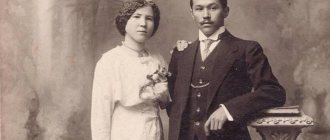Prerequisites
To carry out nikah, it is necessary that the newlyweds comply with a number of mandatory conditions, which are a kind of confirmation that the bride and groom who have decided to marry respect all religious, legal and moral norms.
In some countries, young people must confirm with appropriate documents that they have reached the age of majority, and also behave appropriately for their age.
The Nikah ceremony itself can be held either in a mosque or in the home of the couple, since the place where it is performed is not significant. But an important factor is information about the family ties of the newlyweds. According to the rules, religious marriage is impossible between persons who are related by blood, both in direct lines and closer than the third degree in collateral lines, as well as those who are related by blood closer to the 2nd degree.
Witnesses
The fundamental point for recognizing the legitimacy of this ritual is the presence of at least two male witnesses or two women and one man. If only ladies are the eyewitnesses of the nikah, then such a marriage, according to Hanafi theologians, cannot be considered legal.
Witnesses must be devout Muslims, piously observing religious canons and performing Islamic practices, must be proficient in the language in which the nikah is conducted and have vision.
Guardian
In addition to witnesses, the presence of a guardian on the part of the bride is required at a religious wedding. His role can be played by the girl’s father, or, in the absence of one, by her brother or paternal uncle. If the bride is an orphan, then the local imam has the right to take on this function. By the way, Hanafi Muslims believe that guardians can be excluded from the nikah ceremony, even if the bride is getting married for the first time; the opposite point of view is held by Hanbalites, Shafiites and Malikis. However, all branches of Islam agree that when a woman remarries, she does not need any guardian.
Meeting the bride at the groom's house: interesting traditions of the Tatar wedding
According to Tatar rules, the meeting of the bride is accompanied by a particularly warm and hospitable welcome. Special honor is given to the guest by placing pillows under her feet. Then the bride is treated to bread and honey in the name of good-hearted relations with her mother-in-law and the groom's sisters. And if the bride dips her hands in flour, prosperity and prosperity await the newly-made family.
The ceremony of consecrating the home by the bride deserves special attention. Hanging up new towels and curtains, as well as laying out rugs, gives the bride the right to get comfortable in the new home, and the groom's relatives to look at the dowry.
The move ends with a magnificent feast.
Mahr
No imam will perform a nikah unless the groom confirms his ability to present the bride with a wedding gift called mahr. Unlike the bride price, which goes to the girl’s family as ransom, mahr is intended directly for the betrothed.
The need for such an offering is spoken of in the Koran itself: “Give your wives their mahr from a pure soul. And if they give up something of their own free will, then eat it for good and pleasure” (Surah An-Nisa, verse 4).
The size of the terry can be agreed upon in advance, and then the groom is obliged to fulfill it exactly. If, when concluding a religious marriage, the amount of the wedding gift is not specified, the young man must give the so-called mahr al-misl, that is, a ransom identical to what the girls from the bride’s inner circle received.
However, mahr is not always expressed in material equivalent, since it can be paid as some useful work that the groom will teach the bride. This was eloquently described by the theologian Sahl ibn Sad, who cited in one of the hadiths the response of the Messenger of Allah to the young man’s statement that he did not have the opportunity to pay mahr: “The Messenger of Allah (peace and blessings be upon him) saw this, who called him and asked: “ What do you know (by heart) from the Koran? He replied: “Such and such a surah,” and then the Prophet said: “We are giving her in marriage to you for what you know from the Koran.”
Nikah - marriage according to Sharia law
One of the most significant events in life for Muslims is nikah - marriage according to the norms of Muslim religious law. It is widely known that in Islam the renunciation of marriage and the choice of a monastic lifestyle are not encouraged. And this is the great wisdom of Allah Almighty (Subhana wa Tagala).
“He is the One who created you from a single soul and made a spouse out of her, so that he could rest with her...” (Sura “Barriers”: 189)
Prophet Muhammad (peace and blessings of Allah be upon him) said in this regard: “I am the most righteous and God-fearing among you, but I fast and break my fast, I pray and sleep, and I marry women, and whoever turns away from my Sunnah , not with me."
Allah (Subhana wa Tagala) created man, man and woman in such a way that they were constantly necessary for each other, so that they served as help for each other.
“Another miracle is that He created wives for you from yourselves, so that you could live with them. He has established love and compassion between you. In all this is a sign for a people who think” (Surah Rumah, 21).
At the same time, our All-Merciful Creator protected us from troubles and sins, leaving instructions to create families, testifying before the Almighty and people about the election of a certain woman as a wife or a certain man as a husband. So the prophet Adam (peace be upon him) did not touch Chava until marriage was concluded between them.
To get married, certain conditions must be met. These are:
- Mutual consent of those entering into marriage.
“O you who believe! It is not permissible for you to take inheritance from your wives against their will” (Sura “Women”, verse 19).
A common misconception is that Islam allows a girl’s father to marry off his daughter without her will. This has nothing to do with the truth. No one can force a woman to marry, not even her own father. The Prophet Muhammad (peace and blessings of Allah be upon him) instructed believers on this issue: “The consent of a virgin is asked by her father.” At the same time, an adult capable girl herself has the right, without the permission of the guardian, to give consent to the marriage, however, if the guardian considers the marriage unequal, he can annul it. A woman can give consent by appointing a proxy (vekil) who will convey her answer. The girl's guardian is usually her father, or if there is no father, the closest relative on the father's side. Provided that the girl is an orphan and has no male relatives on her father’s side, her mother can be her guardian.
Sometimes preliminary marriages are concluded, the essence of which is a future marriage union; until adulthood, no one can touch the girl. Only the girl’s father has the right to enter into such a marriage, but when she reaches adulthood, she has the right to annul the marriage.
- Witnesses who are of age and legally capable must be present at the wedding, because the nikah should become known to others. Ibn 'Abbas narrates the following words of the Prophet Muhammad (peace and blessings of Allah be upon him): “Those [women] who give themselves away in marriage without announcing it [i.e. e. without the consent of the guardian and without the participation of witnesses].” According to the Hanafi madhhab, witnesses can be two men, or a man and two women.
Imam Abu Hanifa (may Allah be pleased with him) called it desirable for the girl’s guardian to be present at the nikah, but this is not a prerequisite; he can be replaced by a trusted person. In a situation where the guardian (father) is absent for some time, for example, on a trip, the bride's brother can act as him.
There are also circumstances that serve as an obstacle to nikah. They can be divided into permanent and temporary. The first includes consanguinity or milk kinship, in which a man and a woman had the same wet nurse during childhood. Temporary obstacles include the following circumstances:
-If the bride is the sister of the real wife of the man about to get married;
-If the woman is already the wife of another man;
-If a woman has recently received a divorce, but 3 months have not yet passed, the “iddah” period;
-If a woman is a widow and the period of mourning for her deceased husband has not yet passed - 4 months and ten days;
-If a divorced woman or widow is pregnant, then you need to wait for the birth of the child.
The Holy Qur'an has given a broad and clear explanation regarding this matter:
Do not marry the women your fathers married, unless this has happened before. Truly, this is a vile and hateful act and a bad way. Forbidden to you are your mothers, your daughters, your sisters, your paternal aunts, your maternal aunts, your brother's daughters, your sister's daughters, your mothers who suckled you, your foster sisters, the mothers of your wives, your stepdaughters who are under your patronage, with whose mothers you had intimacy, because if you did not have intimacy with them, then there will be no sin on you; and also the wives of your sons, who came from your loins. It is forbidden for you to marry two sisters at the same time, unless this has happened first. Verily, Allah is Forgiving, Merciful. And married women are forbidden to you, unless they are possessed by your right hands (unless they become your slaves). This is Allah's command for you. All other women are permitted to you if you pursue them through your property, observing chastity and not immorality. And for the pleasure you get from them, give them a set reward (dowry). There will be no sin on you if you come to a mutual agreement after determining the obligatory remuneration (dowry). Verily, Allah is Knowing, Wise. (Sura “Women”: 22-24)
It is very important to remember that a marriage concluded for a certain period is invalid, and people who enter into such a marriage and have marital intimacy commit zina - adultery. From 'Ali ibn Abu Talib (may Allah be pleased with him) the following words are reported: “The Messenger of Allah, may Allah bless him and grant him peace, forbade temporary marriages and eating the meat of a domestic donkey during the campaign against Khaybar.”
To conclude a nikah, among other things, there is one more important condition - it is mahr or bride price, as mahr is sometimes called. Mahr is a gift from the groom to the bride in the form of jewelry, money or other movable and immovable property. Usually the size of the terry is agreed upon in advance, otherwise the groom determines it himself.
“Give them a reward (dowry)” (Surah an-Nisa, verse 25)
At the same time, there is a minimum size of mahr established by Shariah - 1 dirham, equal to the cost of 33.6 grams. silver or the value of 4.8 grams of gold. Thus, the groom has no right to give mahr less than the established minimum. We would like to especially note that mahr is property that will belong to the bride, not her parents, not relatives, but only to the bride.
So, if all the conditions are met, then the Nikah itself is held on a predetermined day. According to the Sunnah of our Prophet Muhammad (peace and blessings of Allah Almighty be upon him), during nikah, men and women are separated. The person who performs the nikah pre-writes down the names of the bride and groom, the names of their fathers and witnesses. The nikah is conducted by a man, a representative of the bride, who is knowledgeable in Sharia issues. Representatives of the bride and groom (men) clarify preliminary agreements on the size of the Mahr among themselves. The Muslim conducting the nikah says:
“Alhamduli-l-Lahi-l-lazi zavvajal arvaha bi-l-ashbahi wa ahale-n-nikyaahi wa harrama-s-sifaha. Wa-s-salatu wa-s-salamu alaa rasulina Muhammadini-l-lazi bayyina-l-harama wa-l-mubah. Wa alaa alihi wa askhabihi-l-lazina hum ahlu-s-salahi wa-l-falyah. Auzu billahi mina-sh-shaitani r-rajim. Bi-media l-Lahi r-Rahmani r-Rahim! Wa ankihu-l-ayyama minkum wa-s-salihina min ibadikum wa imaikum in yakunu fukaraya yugnihimu-l-lahu min fadlihi. Wa-l-Lahu wasiun alim. Sadaka-l-Lahu-l Asiam. Kalya rasul-l-Lahu salla-l-Lahu Taala alayhi wa sallam. An-nikahu sunnati famar-raghiba as-sunnati falayika minni. Sadaqa rasul-l-lahu.”
Translation:
- Praise be to Allah, who united bodies and souls. He permitted marriage and forbade adultery. Peace and blessings of Allah be upon the Messenger Muhammad, who explained to us what is forbidden and what is accessible. Peace and blessings to the family of the Prophet and his companions, worthy of blessing and salvation. I seek protection from Allah Almighty from the expelled Satan in the Name of Allah, the Gracious and Merciful. “And give in marriage the unmarried among you and your righteous male and female servants. If they are poor, Allah will enrich them with His generosity. Allah is All-Comprehending, All-Knowing!” (24:32). And the Prophet (peace and blessings of Allah be upon him) reports: “Nikah is my Sunnah. He who has moved away from my Sunnah is not from me.” Or in shortened form:
“B-smi l-Lahi wa-l-hamdu-lil-Lahi, wa-s-salatu alaa Rasuli-l-Lahi.”
After which he turns to the groom or his representatives. Sample text of the appeal: “According to the order of Allah, according to the Sunnah of the Prophet (peace and blessings of Allah be upon him), according to the ijtihad of Imam Abu Hanifa, with the testimony of those present, in the presence of a preliminary Mahr in the amount of ... rubles and a subsequent Mahr in the amount of ... rubles,” I give you wife's daughter..." The groom must answer that he agrees to this nikah and agrees with the specified amount of mahr. Then the person conducting the nikah reads the dua: “Allahummaj-al haza-l-aqda maymunan mubarakan waj-al bainahuma ulfatan wa mahabbatan wa karara, wa la taj-al bainahuma nafratan wa fitnatan wa firara. Allahumma allif baynahuma kama allafta bayna Adama wa Havwa wa kama allafta bayna Muhammadin wa Khadijatu-l-kubra wa kama allafta bayna Aliyin wa Fatimata-z-Zehra. Allahumma a-ti lekhuma avlyadan salikhan va ryzkan vasian va umran tavilyan. Rabbana heb lana min azvajina wa zurriyatina kurrata a-yunin wa-j-alna li-l-muttakyina imama. Rabbana atina fiddunya hasanata-v-va fil akhirati hassanata-v-va kyna azaban nar.”
Translation:
– My Allah, make this marriage happy and blessed. Please strengthen their marriage and give them lasting love. They were given away from strife and gossip. Strengthen my Allah this marriage just as You strengthened the marriage between Adam and Eve, between the Prophet Muhammad and Khadija, peace and blessings of Allah be upon them, between Ali and Fatima, may Allah be pleased with them. My Allah, give them pious children, great wealth and long life. Lord, send down your goodness on us in this world and the next world, and save us from torment.
Then the last 3 verses of Surah As-Saffat are read. It is advisable to read a marriage sermon during nikah, which can greatly help the newlyweds to understand even more deeply the meaning of their union. It is advisable to arrange wedding refreshments and invite guests. Our Prophet (peace and blessings of Allaah be upon him) said that 'Abdurrahman ibn 'Awf got married: "Arrange a wedding feast by slaughtering at least one ram." Guests, in turn, are very encouraged to accept the invitation. This is stated in the Sunnah: “If one of you was invited to a wedding celebration and did not respond by appearing at the wedding, he is disobedient to the Lord and His Messenger.” An exception can be made if the guest knows for sure that there will be something prohibited at the wedding, for example, alcohol.
The Messenger of Allah (peace and blessings of the Almighty be upon him) said: “Whoever gets married has acquired half of the faith, let him fear Allah in relation to the other half.” Create families, it will protect you from sin and strengthen your faith!
Department of Propaganda and Information of the Muslim Spiritual Directorate of the Republic of Tajikistan
Religion of the persons getting married
When conducting a nikah, the mullah is obliged to make sure that young people do not violate the norms of concluding a Sharia marriage.
According to the Holy Quran, a Muslim woman cannot marry a representative of another religious denomination, much less an atheist: “Do not marry [Muslim women] to pagans until they believe” (2:221).
Other requirements are imposed on men who, with reservations, are allowed to tie the knot with Jewish and Christian women, but are strictly forbidden to marry polytheists or atheists.
Mufti Suhail Tarmohamed, in his book “Modern Fatwas,” notes the conditions under which a Muslim can marry a follower of the religion of Scripture. According to it, a man must marry infidels only in the absence of Muslim women, maintain an Islamic identity and lead an Islamic lifestyle, eat halal food, raise children in the Islamic spirit, and in case of divorce, take the children from his wife.
Marriage vows
The marriage ceremony begins with the reading by a clergyman or even the groom himself of a special introductory sermon consisting of praising the Lord, reciting the shahada and salawat, as well as the proclamation of an verse that calls for fear of God in the relationship between spouses.
Next, the leader of the ceremony invites the groom to publicly propose (ijab) to the bride, who, having decided to accept him, is obliged to pronounce words of consent (kabul) out loud. These secret phrases, called marriage formulas, must be spoken clearly and quickly from the lips of the couple, otherwise a long thought on the bride’s answer may lead to the idea that she is getting married under duress, and the nikah may be declared invalid.
At the end of the religious wedding, a dua (prayer) is said for the unity and future well-being of the family.
What to give the groom at his wedding ceremony
long been customary to give small gifts before nikah . A woman, as a future housewife, must demonstrate her ability to do needlework. Previously, traditional gifts were products of one's own making.
Girls sewed skullcaps and embroidered them with gold or silver threads. Nowadays, a man will be glad if his future wife does something for him with her own hands. However, this is not a prerequisite for nikah.
The girl should not forget about her newly-made relatives, namely her father-in-law and mother-in-law. They will be happy with any homemade product. Whether it's a pie or embroidery. You can give your future father-in-law a national shirt, sewn yourself.
After nikah, a full-fledged family life begins for any married couple. Therefore, many guests come to a religious ceremony with their gifts. Muslims value things that can later be useful as a gift. The newlyweds have not yet set up their home, so they will need interior items .
Popular gifts may include:
- Cutlery.
- Dishes.
- Tea or coffee sets.
- Bed sheets.
- Koran.
- Bright carpets for the wall.
- Soft carpets on the floor.
The Koran provides a list of gifts that are prohibited from giving to your beloved for a religious ceremony.
This list of things can offend the bride:
- Souvenirs.
- Porcelain figurines.
- Silver jewelry.
- Things that have erotic connotations.
Of course, a man should not forget to buy a bouquet for his beloved, which she will bring on nicknames. These can be delicate flowers. Preferably roses, chamomile or violets. It is best not to choose lilies or orchids.
Difference between Nikah and wedding
Just like an Orthodox wedding, nikah is a religious certificate of marriage.
In addition, not only a representative of the clergy, but also a layman who is well versed in the tenets of faith has the right to conduct the ceremony.
When concluding a nikah, the main evidence is not a legal document, which most often is not issued at all, but the testimony of the witnesses present.
In addition, a religious marriage always precedes a trip to the registry office, and for Muslims it is much more important than state registration of relations. As for the wedding, according to the rules, it cannot be held without providing the priest with a marriage certificate.
Weddings do not take place during fasting, on the eve and on the days of church holidays, and most often take place on Friday or Sunday. Nikah can be performed on any day of the year, depending on the wishes of the newlyweds.
There is no strict dress code required for an Islamic wedding ceremony - the bride and groom must be dressed in accordance with generally accepted Muslim norms, while at the wedding the girl must wear a white dress and cover her head with a veil.
What not to give
Nikah is a Muslim wedding, so there are a number of restrictions that apply to gifts.
If you present something forbidden to young people, it may offend them. First of all, we are talking about alcoholic beverages, which are prohibited among Muslims. In addition, you cannot give figurines and souvenirs with an erotic meaning. It is not recommended for the groom to present gold and silver jewelry. But there are not many prohibited gifts, so you can calmly choose a suitable gift that will not offend or offend the newlyweds.
Category: -











